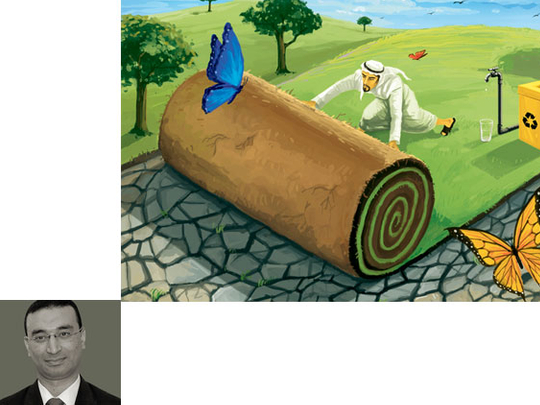
GCC states face many environmental challenges. Some are traditional, linked to water scarcity, land degradation and desertification, and pollution related to oil and gas industry. There are emerging challenges such as increased demand for energy, conservation and diversification, climate change, construction and debris.
Despite the progress that GCC states have made towards meeting Millennium Development Goals (MDGs), more effort is needed. In fact, the 1992 Rio Conference accelerated the setting up and strengthening of environment ministries and authorities in GCC states, the adoption of national action plans and strategies, mobilisation of financial resources and developing environmental policies.
There has been great progress in formulating and executing environmental policies in the GCC. However, environmental governance in general still lacks many dimensions. In addition, there is always a connection between environmental policy and governance. Environmental policy is the main component of environmental governance. Simply put, environmental governance means "a collective design and execution of environmental policies and actions towards achieving environmental goals with proper allocation of power of authorities".
To achieve good environmental governance, there is a need for community participation in drafting policies. Besides, proper allocation of authority needs to be enhanced and environmental institutions must be empowered. Strengthening the role of various stakeholders (NGOs, the private sector, local communities etc) would improve execution, monitoring, reporting and contribute towards achieving the collective goals as well as increasing the cooperation at national and regional levels. This would also lead to better implementation of environmental policies.
Reducing impact of climate change
Water policies in the region must focus on supply development, aiming to overcome shortages through technical solutions including desalination and allocation of financial resources for some countries making good progress towards meeting the MDG water supply and sanitation targets, especially in urban areas.
National action plans to combat land degradation and desertification should be integrated with sustainable use of natural resources, synergised with biodiversity conservation and plans to reduce the impact of climate change.
Despite rich renewable resources in GCC states, the energy sector is still characterised by a heavy reliance on fossil fuels leading to an adverse impact on the environment and high carbon intensity. Policy development to promote energy efficiency, renewable energy and mitigate climate change is evolving. It is worth mentioning here the pioneering initiative of Abu Dhabi, which came up with Masdar City, the first carbon-free city in the world. Add to that the implementation of green building codes in the UAE, Qatar and Kuwait.
The GCC states are witnessing strong coastal development plans. These countries should confirm their commitment to protect the coastal and marine ecosystem through regional cooperation, and application of integrated coastal zone management. In this regards, Qatar completed a detailed coastal inventory using fine scale, airborne image analysis. And the excellent project of inventory and mapping of coral reefs of Abu Dhabi and eastern Qatar.
Environmental institutions have been accorded higher priority and status in all GCC states. Accordingly different institutions have been established to implement policies, enforce laws and set standards and norms. However, the public participation in the major groups in environmental governance remains weak. There is no clear policy for integration of these groups into the environmental governance process, either at national or at regional levels.
Environmental policies in the GCC rely mainly upon Command And Control (CAC) mechanisms rather than on economic instruments. Recently, there have been various initiatives to include economic instruments mechanism to alter incentives and change behaviour, such as the water cost recovery options adopted in places such as Dubai and Abu Dhabi, and the road toll system in Dubai. In addition, GCC states depend on the persuasive mechanism alongside the other two mechanisms. It addresses the moral aspects of environmental responsibility, including religious and social aspects. This approach can take the form of education, risk communication, provision of information and knowledge as well as capacity-building.
There is a general lack of coherent environmental information and information tools in the region. There is a need to collect, process, analyse, produce and disseminate environmental information in a systematic way. Exchange of environmental information and cooperation is lacking between institutions in one country and between GCC states. In this regard, the excellent initiative in the UAE, the Abu Dhabi Global Environmental Data Initiative is praiseworthy.
Trends show the need to make use of additional instruments to improve the enforcement and compliance processes. In addition, there is a significant need for regular environmental reporting in all GCC states as well as increasing the public and private participation in monitoring.
The level of response and compliance for regional environmental ministries is generally higher than for global environmental ministries. For example, national action plans have been developed by all eight signatories (GCC states, Iraq and Iran) to the Kuwait Regional Convention.
In short, the way to overcome all the above environmental challenges is good environmental governance. In general, GCC states have made considerable progress in environmental governance. However the trends show the need to make use of additional policy tools, and engage the various stakeholders in the governance process.
Dr Mohammad Abdel Raouf is an Independent Environmental Researcher.









